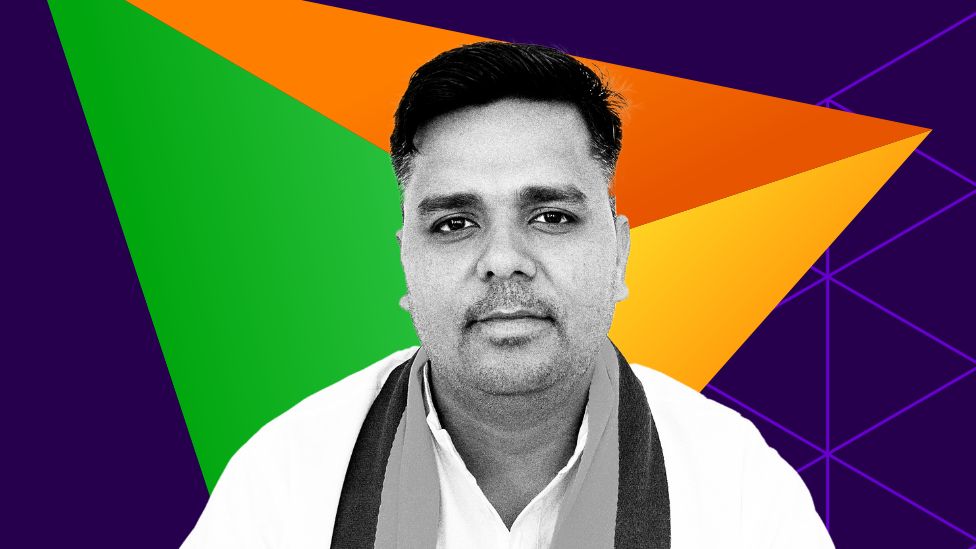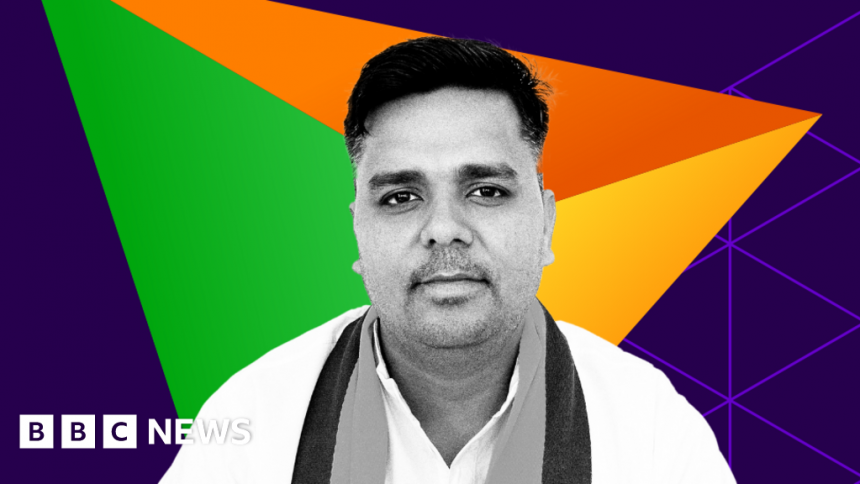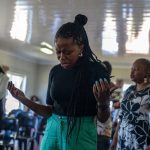Lok Sabha 2024: Modi’s party volunteers targeting 100,000 people a day
-
Published

Ankur Rana, a social media coordinator for the BJP, manages hundreds of WhatsApp groups
Ankur Rana types furiously into his phone, sending messages across the hundreds of WhatsApp groups he manages.
“I have 400-450 WhatsApp groups which each have about 200-300 members. Apart from this, I have about 5,000 direct contacts. In this way, I personally reach 10-15,000 people every day,” the social media coordinator for the Bharatiya Janata Party (BJP) in the Meerut parliamentary constituency in western Uttar Pradesh explained in the run-up to voting last month.
He was part of a crack team set up to ensure the BJP gets its message out to millions of voters – groups which are then replicated across dozens of constituencies in Uttar Pradesh alone.
The scale of the operation is eye-watering, but then the BJP have identified WhatsApp – along with other messaging and social media apps – as a key route to reach their ambitious target of 370 seats in this year’s Lok Sabha election.
And that is for good reason: India is WhatsApp’s biggest market globally with more than half a billion users who spend several hours a day on the messaging platform.
They forward everything from “good morning” to memes – and, crucially, political commentary in different languages.
And volunteers like Ankur are a key cog of the election machine, trying to ensure that the BJP’s messaging is part of all that.
The BBC spoke to 10 other BJP volunteers who also work as constituency social media coordinators in Uttar Pradesh and they all said they run hundreds of WhatsApp groups, with members ranging from 200 to 2,000 each.
Volunteers from the BJP office in Meerut sent thousands of messages to people every day
It is a tightly controlled operation: BJP volunteers in Meerut say that each day, the party’s headquarters in Delhi sends political messages and hashtags – these range from praising Prime Minister Narendra Modi and the BJP to criticising the opposition – that need to trend to the state-level headquarters.
From there, the messages reach 180 Meerut constituency volunteers, including Ankur. These volunteers distribute messages further down the chain, and it eventually reaches those managing the campaign for each polling booth.
WhatsApp is particularly useful in reaching the young, says Ankur, who runs a digital marketing company in Mumbai when not doing unpaid volunteering for the BJP.
The over-40s, he reveals, are more active on Facebook.
“On average, our target is to reach 100,000-150,000 new people each day,” he says.
Experts note that when it comes to social media, the BJP’s seemingly unparalleled social media campaign appears to be pulling away from its rivals.
But none of it works without the personal touch, party activists say – especially as they need to get people’s numbers in the first place.
Vipin showed us a single page with the photos, names and details of 30 voters on each side that’s given to every party worker
“Each member of the party, from the bottom to the very top, including the party president, is responsible for 60 voters,” said Vipin Vipala, in charge of campaigning for the BJP near a polling booth in Meerut.
“We have to continuously make face-to-face contact with the 60 people assigned to us and encourage them to vote for the BJP. It’s also our responsibility to take their mobile numbers and include them in our messaging groups.”
Vipin’s WhatsApp group for the set of voters assigned to him is named ‘Humanity is Life’. In this case, not making the group overtly political seems to be a part of the appeal.
But as everyone knows, when it comes to the internet, keeping total control of the narrative is nigh on impossible.
And when that narrative is being shared on private WhatsApp accounts and groups, it is also extremely difficult to know exactly what is being shared – and where it came from in the first place.
One viral message that was forwarded many times in several groups the BBC saw included claims accusing the Congress party of carrying out appeasement of the Muslim minority.
In Hindi it read: “Congress had already converted India into an Islamic country, they just never officially announced it”. The message went on to list 18 ways in which it was claimed that the Congress favours the Muslim community.
Its origins are impossible to establish, but the fact is it does mirror comments made by the BJP leadership during election rallies in recent weeks.
In April, Mr Modi himself was accused of Islamophobia after claiming in rallies that the opposition would distribute people’s wealth to “infiltrators” if they won power, in remarks referring to Muslims.
The BJP’s own social media handles have shared animated videos repeating the point, and its leaders have wrongly claimed that this is written in the Congress’s manifesto. The document does not mention redistributing wealth or the word Muslims.
Kiran Garimella, assistant professor at Rutgers University, who is researching the use of WhatsApp in India, says that the official narrative of political parties is often mirrored on private groups – but then, it becomes difficult to unpick what is official, and what is unofficial.
“There is a top-down push, there is the IT cell (the BJP’s social media team) operation and there is content generated around that which is sustained and coordinated. But the main innovation is in the fact that there is buy-in from normal people in spreading these sorts of narratives,” he says, adding that given the nature of WhatsApp, it is hard to understand “which is IT cell content and which is supporter content”.
And while messages might originate on one platform, they can end up circulating across other media as well, convincing people that what they see is the truth.
In a recent campaign advertisement, the BJP implied that Mr Modi had got Russia’s war in Ukraine paused to evacuate Indian students stuck there amidst the fighting.
The advertisement shows perplexed couples awaiting their children at an Indian airport as a young woman hugs her parents and tells them Mr Modi “stopped the war”
It was a claim first made back in March 2022, soon after the war began, by several accounts on X and amplified by some news channels.
At the time, India’s foreign affairs ministry rejected the claim. “To say that somebody’s holding off bombing, or that, you know, this is something we are co-ordinating, that I think is absolutely inaccurate,” a spokesman had said.
Two years on, the BJP’s top leaders have mentioned it during the election campaign and the ad was widely viewed on social media. The BJP didn’t respond to a question on why it was repeating the claim.
Outside Meerut University, we met students in their early 20s who are first-time voters. We asked them whether they had heard the claim, and what they believed.
Most students said they believe Mr Modi stopped the Russia-Ukraine war for a few hours
Most said they’d come across it on X.
“Yes, definitely we believe the war was paused because of India’s request,” said Vishal Verma to agreement from his friends. Others gathered around us nodded in agreement. Just a couple of students disagreed. Kabir said, “It is not true. I have seen videos made by the students themselves who said the government didn’t help them.”
We asked the same question to people in a nearby village, many of whom had seen the claim being made on TV news.
“Yes, the war was stopped because Modi is respected globally,” said Sanjeev Kashyap, a 41-year-old farmer.
“Look, we have heard the war was stopped. We have not gone to see for ourselves. But I think there must be some truth in it,” said 75-year-old Jagdish Chaudhury. Four other villagers agreed with him.
It’s a crucial power – being able to influence what people believe. Ultimately it may affect how they vote.






